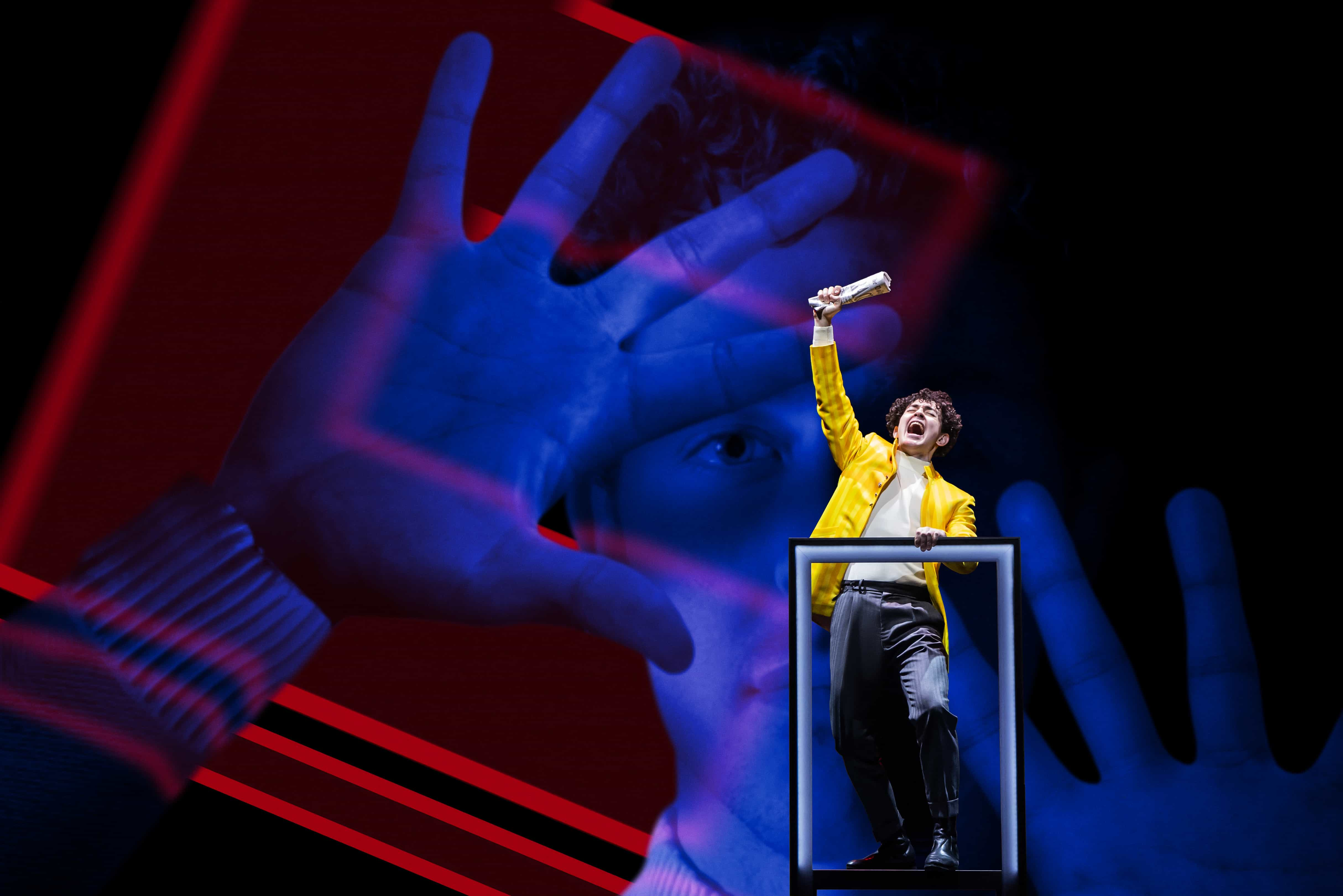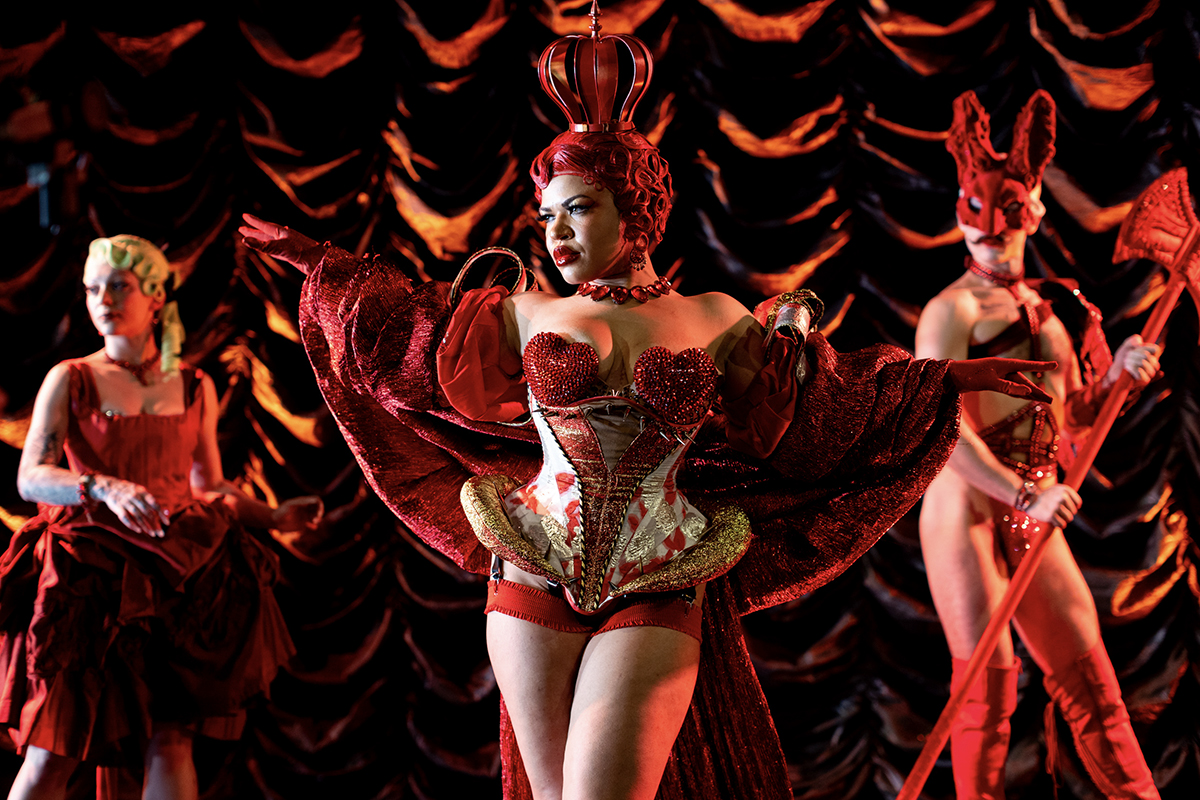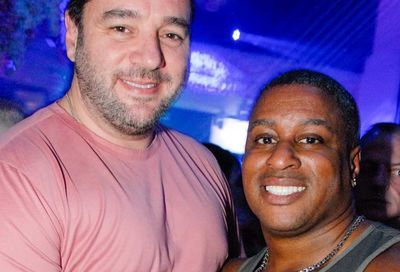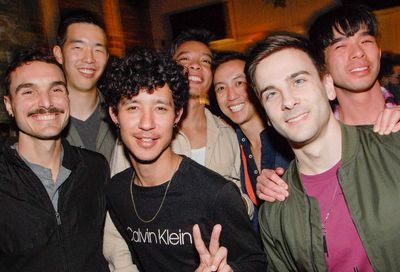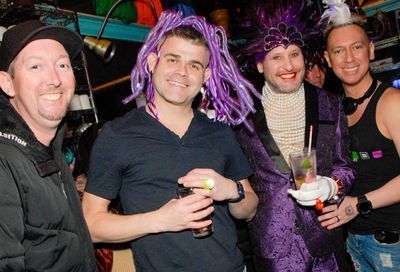Review: Constellation Theatre’s “The Wild Party”
The music and dancing delight, but the leads don't quite deliver in Constellation's The Wild Party
By André Hereford on September 28, 2017 @here4andre

The band is blowing, the hooch is flowing, and the guests are lit. But Constellation Theatre’s new production of The Wild Party (★★½) doesn’t lift off to the heights it should, in order to fully convey the dizzying descent and devastating impact when the party comes crashing down.
As surely as the stock market crash brought the curtain down on the Roaring ’20s, a bloody end does come to the swell party at the center of this Jazz Age musical from 1999, based on the eponymous narrative poem by Joseph Moncure March. The publication of March’s poem presaged the Great Depression by over a year, yet somehow perfectly captured the precipitous decline of a golden era in its story of Queenie and Burrs, two high-living lovers brought low by pride and jealousy.
Featuring a book, music, and lyrics by Andrew Lippa (Big Fish), The Wild Party presents the Queenie and Burrs romance as a straightforward drama of lust and angst, infused by an electrifying jazz-influenced score.
The music is as hot as ever in Constellation’s production, directed by Allison Arkell Stockman, and musical director Walter “Bobby” McCoy leads a swinging seven-piece band through the rag, rumba, and blues of Lippa’s stylistically varied, emotionally evocative tunes. Meanwhile, choreographer Ilona Kessell, a Helen Hayes nominee for her work on Constellation’s 2016 production of Urinetown, puts the ensemble through their vigorous paces with toe-tapping, tightly synchronized jumping and jiving that does its share to keep the party lifted. Costume designer Erik Teague has outfitted the cast in snazzy period suits and flapper gowns that generously complement all that jazz stepping. And Tony Cisek’s sets, while beautifully concealing the bandstand, create an environment somewhere between a speakeasy and grandma’s basement that feels just right.
Where the party sags is in the middle, with a lead foursome who are two players shy of a solid quartet. As Queenie, the hostess, Farrell Parker swaggers and stares with a glint in her eye that befits this doyenne of the free-and-easy bohemian scene. But her tart demeanor falters in song, and, although the show supplies Queenie with a few party-starting numbers, Parker’s interpretations don’t really raise the roof.

A vaudeville hoofer intent on serving a public comeuppance to her rough-handed lover Burrs, Queenie should come on like a minx hiding a dagger behind her back. Yet, Parker’s Queenie feels neither dangerous nor aggrieved enough to twist the knife as willfully as she does in her efforts to make her man suffer. Partly, that seems due to the scant onstage connection between Parker and Jimmy Mavrikes, as the sad clown Burrs.
Queenie and Burrs are a couple bound particularly by their intense sexual chemistry, and that sort of combustion doesn’t register here. Mavrikes sings and broods with passion, however, adding an undercurrent of dark unpredictability that helps drive suspense, as the sex and gin-soaked party builds to its climax.
Long before that, and even before the first act closes, the fabulous Kari Ginsburg’s entrance as Kate, a boozy, bedraggled partygoer who lusts after Burrs, is a climax unto itself, with the actress bursting onstage to perform “Look at Me Now.” A rousing force of talent, tenderness, and moxie, Ginsburg shifts the gravity onstage, projecting a maturity of experience that’s mostly missing from the other members of this uniformly young cast. Few in the cast convey scars of life as surely as Ginsburg. Where her Kate has been and where she’s going is of far more compelling interest than whether Queenie will steal away the handsome stranger who accompanies Kate to the party, the mysterious Mr. Black.

The fourth in this unbalanced love quadrangle, Mr. Black appears as this wild party’s It Boy, the beautiful face and form that enchants everyone in attendance — with perhaps the exception of licentious lesbian Madeline (a wonderful Rachel Barlaam). Unfortunately, neither Black, nor Lippa’s excellent songs for him, are done any service by Ian Anthony Coleman’s unpersuasive vocal performance.
Whatever mysteries Black might be hiding, there’s barely a hint of a past life in Coleman’s characterization. Luckily for the audience, there are plenty other intriguing guests worth meeting, and the shindig doesn’t ride completely on Queenie deciding to bet it all on Black.
The Wild Party runs until October 29th at Source Theatre, 1835 14th St. NW. Tickets are $25 to $55. Call 202-204-7741, or visit ConstellationTheatre.org.
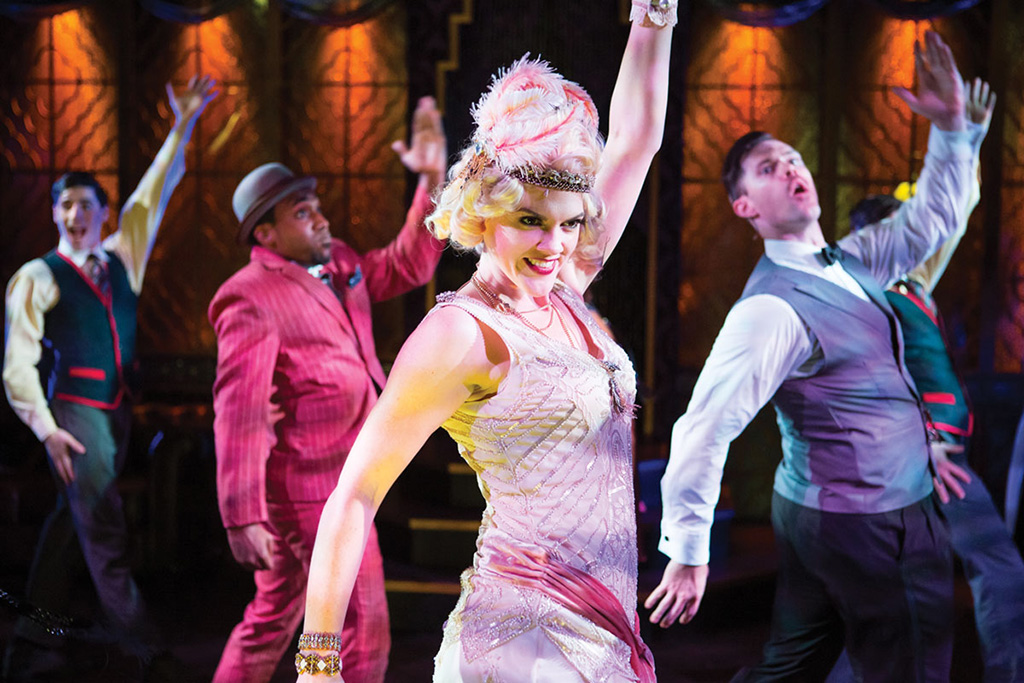
‘Tommy’ is a High-Speed, Full-Throttle Revival (Review)
"The Who's Tommy: delivers all the goods in a thrilling production starring Ali Louis Bourzgui, a superstar in the making.
By Ryan Leeds on April 9, 2024
READ THIS STORY IN THE MAGAZINE
The Who's rock opera Tommy is back on Broadway, and the result is a high-speed, full-throttle revival that leaves audiences so riveted they need hours to unwind.
Unquestionably, there's been a ton of mileage used for this franchise. After the critically acclaimed album's release in 1969, it went on to become a ballet, an opera, a symphonic version, a motion picture (featuring Elton John and Tina Turner), and several iterations of stage shows, first in 1993 (Broadway and national tour), later in 2013 at the Stratford Shakespeare Festival, and now, back on Broadway after a lauded run at Chicago's Goodman Theatre last year. Why all the hype?
Stage: Spring Arts Preview 2024
From a Macbeth starring Ralph Fiennes to an unabashed Hair at Signature, the spring season on D.C.-area stages is as vibrant as ever.
By Randy Shulman on March 30, 2024 @RandyShulman
READ THIS STORY IN THE MAGAZINE
There is still an abundance of great theater remaining in the season, including the absolute showstopper at The Shakespeare Theatre -- Simon Godwin's production of Macbeth starring Ralph Fiennes and Indira Varma. But, let's be honest, all of our area theatres have showstoppers up their sleeves...
Signature lets its hair down. Baltimore Center Stage serves up some fiery wings. Mosaic tells the tale of two Nancys. Folger takes on the Gods. GALA gets into mummified territory. Keegan slams door after door after door. Ford's feeds a very big, bloodthirsty plant. Richmond Triangle Players cavort in Xanadu. And that's just a sampling.
Queen of Hearts: Down the Sexy Rabbit Hole (Review)
Company XIV pulls out the stops with "Queen of Hearts," a bawdy and brilliant adult riff on "Alice in Wonderland."
By Ryan Leeds on March 30, 2024
From the moment they slink across the stage, you're hooked and hypnotized, willing to follow them with reckless abandonment to the ends of the earth. That is precisely where the cast of Company XIV will take you in a reinvented version of their long-running hit Queen of Hearts.
Since 2006, creator Austin McCormick has been the engine behind this dance troupe that mixes Victorian-era propriety with the bawdiness and bodies of burlesque. Each show has been an irresistible treat. By now, loyal fans know that delicious visual snacks will be served.
This time, however, McCormick has outdone himself with a grand buffet that is so wonderfully satisfying. It feels like delightful gluttony, and indulgence has never been quite this rewarding.
Support Metro Weekly’s Journalism
These are challenging times for news organizations. And yet it’s crucial we stay active and provide vital resources and information to both our local readers and the world. So won’t you please take a moment and consider supporting Metro Weekly with a membership? For as little as $5 a month, you can help ensure Metro Weekly magazine and MetroWeekly.com remain free, viable resources as we provide the best, most diverse, culturally-resonant LGBTQ coverage in both the D.C. region and around the world. Memberships come with exclusive perks and discounts, your own personal digital delivery of each week’s magazine (and an archive), access to our Member's Lounge when it launches this fall, and exclusive members-only items like Metro Weekly Membership Mugs and Tote Bags! Check out all our membership levels here and please join us today!
The Magazine
-
Most Popular
 MSNBC's Kyle Griffin: Working for The Weekend
MSNBC's Kyle Griffin: Working for The Weekend  George Santos, Duped by NAMBLA Prank, Exits Race for Congress
George Santos, Duped by NAMBLA Prank, Exits Race for Congress  Trolls Hate on No. 1 NFL Draft Pick for Pink Phone and Nail Polish
Trolls Hate on No. 1 NFL Draft Pick for Pink Phone and Nail Polish  'Challengers' is a Sexy, Ripping Love Match (Review)
'Challengers' is a Sexy, Ripping Love Match (Review)  For Don Mancini, Chucky is So Much More Than a Killer Toy
For Don Mancini, Chucky is So Much More Than a Killer Toy  Ralph Fiennes and Indira Varma Soar in STC's 'Macbeth' (Review)
Ralph Fiennes and Indira Varma Soar in STC's 'Macbeth' (Review)  The Awesome Power of Katy O'Brian
The Awesome Power of Katy O'Brian  The Powerful Story Behind David Archuleta's ‘Hell Together’
The Powerful Story Behind David Archuleta's ‘Hell Together’  California Mayor Recalled After Coming Out as Transgender
California Mayor Recalled After Coming Out as Transgender  Grindr is Being Sued for Sharing HIV Statuses
Grindr is Being Sued for Sharing HIV Statuses
 MSNBC's Kyle Griffin: Working for The Weekend
MSNBC's Kyle Griffin: Working for The Weekend  'Challengers' is a Sexy, Ripping Love Match (Review)
'Challengers' is a Sexy, Ripping Love Match (Review)  'Human Museum' Puts the Bots in Charge (Review)
'Human Museum' Puts the Bots in Charge (Review)  George Santos, Duped by NAMBLA Prank, Exits Race for Congress
George Santos, Duped by NAMBLA Prank, Exits Race for Congress  Grindr is Being Sued for Sharing HIV Statuses
Grindr is Being Sued for Sharing HIV Statuses  Judge Blocks Ohio's Anti-Transgender Bans
Judge Blocks Ohio's Anti-Transgender Bans  D.C. Courts Pop-Up Businesses Ahead of WorldPride
D.C. Courts Pop-Up Businesses Ahead of WorldPride  Cher to be Inducted in the Rock & Roll Hall of Fame
Cher to be Inducted in the Rock & Roll Hall of Fame  Texas Governor Wants to Ban Trans People from Being Teachers
Texas Governor Wants to Ban Trans People from Being Teachers  For Don Mancini, Chucky is So Much More Than a Killer Toy
For Don Mancini, Chucky is So Much More Than a Killer Toy
Scene
Metro Weekly
Washington's LGBTQ Magazine
P.O. Box 11559
Washington, DC 20008 (202) 638-6830
About Us pageFollow Us:
· Facebook
· Twitter
· Flipboard
· YouTube
· Instagram
· RSS News | RSS SceneArchives
- "We use cookies and other data collection technologies to provide the best experience for our customers. You may request that your data not be shared with third parties here: "Do Not Sell My Data
Copyright ©2024 Jansi LLC.



